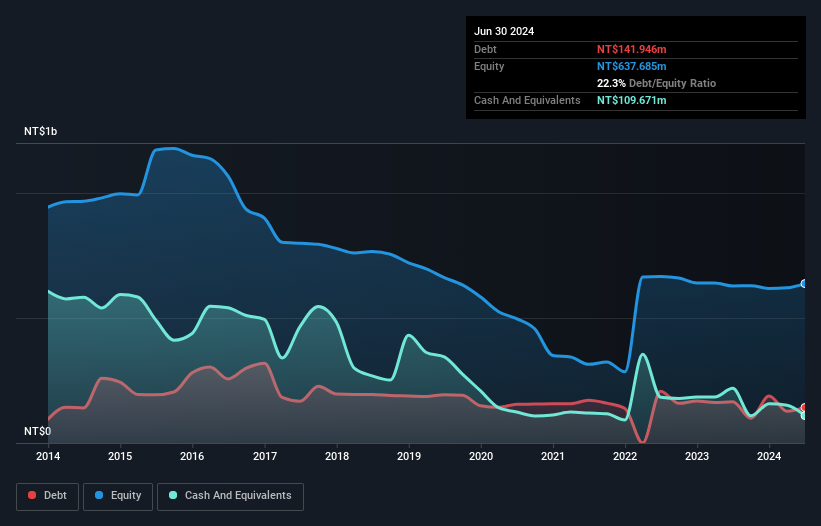- Taiwan
- /
- Electronic Equipment and Components
- /
- TWSE:3229
Here's Why Cheer Time Enterprise (TWSE:3229) Can Afford Some Debt
The external fund manager backed by Berkshire Hathaway's Charlie Munger, Li Lu, makes no bones about it when he says 'The biggest investment risk is not the volatility of prices, but whether you will suffer a permanent loss of capital.' So it might be obvious that you need to consider debt, when you think about how risky any given stock is, because too much debt can sink a company. We can see that Cheer Time Enterprise Co., Ltd (TWSE:3229) does use debt in its business. But the real question is whether this debt is making the company risky.
When Is Debt Dangerous?
Debt is a tool to help businesses grow, but if a business is incapable of paying off its lenders, then it exists at their mercy. In the worst case scenario, a company can go bankrupt if it cannot pay its creditors. However, a more usual (but still expensive) situation is where a company must dilute shareholders at a cheap share price simply to get debt under control. By replacing dilution, though, debt can be an extremely good tool for businesses that need capital to invest in growth at high rates of return. When we examine debt levels, we first consider both cash and debt levels, together.
View our latest analysis for Cheer Time Enterprise
What Is Cheer Time Enterprise's Debt?
As you can see below, Cheer Time Enterprise had NT$141.9m of debt at June 2024, down from NT$164.8m a year prior. On the flip side, it has NT$109.7m in cash leading to net debt of about NT$32.3m.

A Look At Cheer Time Enterprise's Liabilities
We can see from the most recent balance sheet that Cheer Time Enterprise had liabilities of NT$239.4m falling due within a year, and liabilities of NT$20.9m due beyond that. On the other hand, it had cash of NT$109.7m and NT$264.4m worth of receivables due within a year. So it actually has NT$113.7m more liquid assets than total liabilities.
This surplus suggests that Cheer Time Enterprise has a conservative balance sheet, and could probably eliminate its debt without much difficulty. The balance sheet is clearly the area to focus on when you are analysing debt. But you can't view debt in total isolation; since Cheer Time Enterprise will need earnings to service that debt. So when considering debt, it's definitely worth looking at the earnings trend. Click here for an interactive snapshot.
In the last year Cheer Time Enterprise had a loss before interest and tax, and actually shrunk its revenue by 8.2%, to NT$898m. That's not what we would hope to see.
Caveat Emptor
Importantly, Cheer Time Enterprise had an earnings before interest and tax (EBIT) loss over the last year. Indeed, it lost NT$2.1m at the EBIT level. On a more positive note, the company does have liquid assets, so it has a bit of time to improve its operations before the debt becomes an acute problem. Still, we'd be more encouraged to study the business in depth if it already had some free cash flow. This one is a bit too risky for our liking. There's no doubt that we learn most about debt from the balance sheet. However, not all investment risk resides within the balance sheet - far from it. For example - Cheer Time Enterprise has 3 warning signs we think you should be aware of.
If you're interested in investing in businesses that can grow profits without the burden of debt, then check out this free list of growing businesses that have net cash on the balance sheet.
Mobile Infrastructure for Defense and Disaster
The next wave in robotics isn't humanoid. Its fully autonomous towers delivering 5G, ISR, and radar in under 30 minutes, anywhere.
Get the investor briefing before the next round of contracts
Sponsored On Behalf of CiTechNew: AI Stock Screener & Alerts
Our new AI Stock Screener scans the market every day to uncover opportunities.
• Dividend Powerhouses (3%+ Yield)
• Undervalued Small Caps with Insider Buying
• High growth Tech and AI Companies
Or build your own from over 50 metrics.
Have feedback on this article? Concerned about the content? Get in touch with us directly. Alternatively, email editorial-team (at) simplywallst.com.
This article by Simply Wall St is general in nature. We provide commentary based on historical data and analyst forecasts only using an unbiased methodology and our articles are not intended to be financial advice. It does not constitute a recommendation to buy or sell any stock, and does not take account of your objectives, or your financial situation. We aim to bring you long-term focused analysis driven by fundamental data. Note that our analysis may not factor in the latest price-sensitive company announcements or qualitative material. Simply Wall St has no position in any stocks mentioned.
About TWSE:3229
Cheer Time Enterprise
Engages in the manufacturing, processing, and sales of rigid printed circuit boards (PCBs) Asia, North America, Oceania, and Europe.
Flawless balance sheet with very low risk.
Market Insights
Weekly Picks

Early mover in a fast growing industry. Likely to experience share price volatility as they scale


A case for CA$31.80 (undiluted), aka 8,616% upside from CA$0.37 (an 86 bagger!).


Moderation and Stabilisation: HOLD: Fair Price based on a 4-year Cycle is $12.08
Recently Updated Narratives

Airbnb Stock: Platform Growth in a World of Saturation and Scrutiny

Adobe Stock: AI-Fueled ARR Growth Pushes Guidance Higher, But Cost Pressures Loom

Thomson Reuters Stock: When Legal Intelligence Becomes Mission-Critical Infrastructure
Popular Narratives


Crazy Undervalued 42 Baggers Silver Play (Active & Running Mine)


NVDA: Expanding AI Demand Will Drive Major Data Center Investments Through 2026


The AI Infrastructure Giant Grows Into Its Valuation
Trending Discussion




